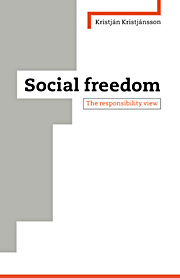Book contents
- Frontmatter
- Contents
- Acknowledgements
- 1 Introduction: freedom from Berlin onwards
- 2 Negative freedom: the nature of constraints
- 3 Obstacles and their weight
- 4 The test of moral responsibility
- 5 Internal bars and positive liberty
- 6 Freedom and power
- 7 Observations on method
- 8 Concluding remarks
- Bibliography
- Index
1 - Introduction: freedom from Berlin onwards
Published online by Cambridge University Press: 31 March 2010
- Frontmatter
- Contents
- Acknowledgements
- 1 Introduction: freedom from Berlin onwards
- 2 Negative freedom: the nature of constraints
- 3 Obstacles and their weight
- 4 The test of moral responsibility
- 5 Internal bars and positive liberty
- 6 Freedom and power
- 7 Observations on method
- 8 Concluding remarks
- Bibliography
- Index
Summary
This book aims to expound and defend a certain view of social freedom which I shall call the responsibility view. Arguably, for reasons of methodology if not human psychology, a study of this kind is best begun by laying down some provisional theories or hypotheses which are then put to the test: substantiated, amended, or discarded as the work progresses. But, as this book presents a conceptual analysis and not an autobiography, I see no reason to preface it by describing the basic ideas with which I started and the story of my struggle with them, nor does the plan of this work reflect the order in which I reached my conclusions. Rather, I shall present and develop my account in what appears to me, on afterthought, to be the most logical order. For example, while it was plain from the start that a multitude of methodological questions would have to be addressed, discussion of them is postponed until chapter 7.
My line of argument may appear to follow a somewhat circuitous route, at least to those not versed in the regular twists and turns of contemporary accounts of freedom, touching on many issues whose interrelations need not always be immediately clear. Thus, while chapter 2 focuses on a host of different versions of so-called negative liberty, chapter 3 introduces the problem of the necessary ‘weight’ of potential freedom-restricting obstacles and brings the discussion to bear on a long-standing controversy regarding the nature of threats and offers.
- Type
- Chapter
- Information
- Social FreedomThe Responsibility View, pp. 1 - 15Publisher: Cambridge University PressPrint publication year: 1996



